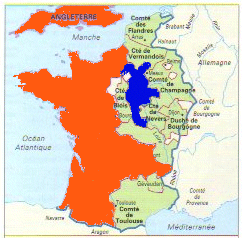
In its fullest extent, the Angevin Empire comprised the Kingdom of England, the Lordship of Ireland, the Duchy of Normandy and the Duchy of Aquitaine (the duchy of Aquitaine, which included the County of Poitiers, the Duchy of Gascony, the County of Périgord, the County of La Marche, the County of Auvergne and the Viscountcy [shrievalty] of Limoges), which were the lands belonging to his wife, Eleanor of Acquitaine, and the County of Anjou (which included the County of Maine and the County of Tours) which he inherited from his parents. The Plantagenets also had influence in the Duchy of Brittany, in the Welsh independent principalities, in the Kingdom of Scotland and the County of Toulouse, although these territories were not formally part of the empire. The King of Scotland paid homage to Henry II of England for the lands he held in England.
The Lord Rhys of Deheubarth in south Wales, and Owain ap Gruffudd, Prince of Wales, were made to swear fealty to Henry II in 1163, at Woodstock, but broke their oaths in 1165. So Wales was never really part of the empire.
In the Treaty of Falaise 1174 King William of Scotland was made to swear that Scotland would thereafter be subordinate to the English crown.
In 1155, Pope Adrian IV, issued a papal bull (known as Laudabiliter) that gave Henry II permission to invade Ireland as a means of strengthening the Papacy's control over the Irish Church. During 1171, Henry II landed an army in Waterford to ensure his continuing control over the preceding Norman force. In the process he took Dublin and had accepted the fealty of the Irish kings and bishops by 1172, so creating the Lordship of Ireland, which formed part of his Angevin Empire.
It is significant that Henry II and his sons and their lands in France were not outright kings of these territories, but only held these as fiefs of the King of France, to whom on several occasions they did homage for them.
References
Angevin Empire - Wikipedia
Empire Plantagenêt -Wikipédia
Historical Atlas of Britain : Internet Archive
Atlas historique : de l'apparation de l'homme sur la terre à l'ère átomique : Hilgemann, Werner - Internet Archive p.154-
The Making of the Angevin Empire
C. Warren Hollister and Thomas K. Keefe
Journal of British Studies
Vol. 12, No. 2 (May, 1973), pp. 1-25 Published by: Cambridge University Press on behalf of The North American Conference on British Studies
Stable URL: http://www.jstor.org/stable/175272
John France (2002). Western Warfare In The Age Of The Crusades, 1000-1300. Chapter 4 Warfare and Authority: Routledge. pp. 39–. ISBN 978-1-135-36507-3.
2nd May 1156: King Henry II did homage to Louis for Normandy, Anjou and Aquitaine.
George Garnett (1994). Law and Government in Medieval England and Normandy: Essays in Honour of Sir James Holt. J.O. Prestwich: Military Intelligence Under the Norman and Angevin Kings: Cambridge University Press. pp. 1–. ISBN 978-0-521-43076-0.
George Garnett (1994). Law and Government in Medieval England and Normandy: Essays in Honour of Sir James Holt. J.O. Prestwich: Military Intelligence Under the Norman and Angevin Kings: Cambridge University Press. pp. 1–. ISBN 978-0-521-43076-0.
The Scholar's History of England ... : James H Ramsay Volume II Angevin Empire
Daniel Power (16 December 2004). The Norman Frontier in the Twelfth and Early Thirteenth Centuries. Cambridge University Press. pp. 1–. ISBN 978-0-521-57172-2.
Christopher Harper-Bill (1995). Proceedings of the Battle Conference 1994. Boydell & Brewer Ltd. pp. 181–. ISBN 978-0-85115-606-4.
The Problem of Survival for the Angevin "Empire": Henry II's and His Sons' Vision versus Late Twelfth-Century Realities
Author(s): Ralph V. Turner
Source: The American Historical Review, Vol. 100, No. 1 (Feb., 1995), pp. 78-96
Published by: Oxford University Press on behalf of the American Historical Association
Stable URL: http://www.jstor.org/stable/2167984
The Problem of Survival for the Angevin "Empire": Henry II's and His Sons' Vision versus Late Twelfth-Century Realities
Author(s): Ralph V. Turner
Source: The American Historical Review, Vol. 100, No. 1 (Feb., 1995), pp. 78-96
Published by: Oxford University Press on behalf of the American Historical Association
Stable URL: http://www.jstor.org/stable/2167984
Fanny Madeline, « Les processus d’identification et les sentiments d’appartenance politique aux frontières de l’empire Plantagenêt », Cahiers de recherches médiévales et humanistes [En ligne], 19 | 2010, mis en ligne le 30 juin 2013, consulté le 16 septembre 2014. URL : http://crm.revues.org/11985
Table of the Fiefdoms of France
Jacob Nicolas Moreau (1784). Principes
de morale, de politique et de droit public, puisés dans l'histoire de
notre monarchie ou Discours sur l'histoire de France. Imprimerie Royale. pp. 487–.
E.A. Freeman’s review of Kate Norgate's England under the Angevin Kings,
E.H.R., 2:8, 1887, pp. 774-780
England Under the Angevin Kings Volume 1 Norgate, Kate
England Under the Angevin Kings Volume 2 Norgate, Kate
Maurice Powicke (1999). The Loss of Normandy: 1189 - 1204 ; Studies in the History of the Angevin Empire. Manchester University Press. ISBN 978-0-7190-5740-3
Francisque Michel (1837). Anglo-Norman Poem on the Conquest of Ireland by Henry the Second. W. Pickering.
Laudabiliter - Wikipedia
Richard Huscroft (26 April 2016). Tales From the Long Twelfth Century: The Rise and Fall of the Angevin Empire. Yale University Press. ISBN 978-0-300-18728-1.






No comments:
Post a Comment
Note: only a member of this blog may post a comment.